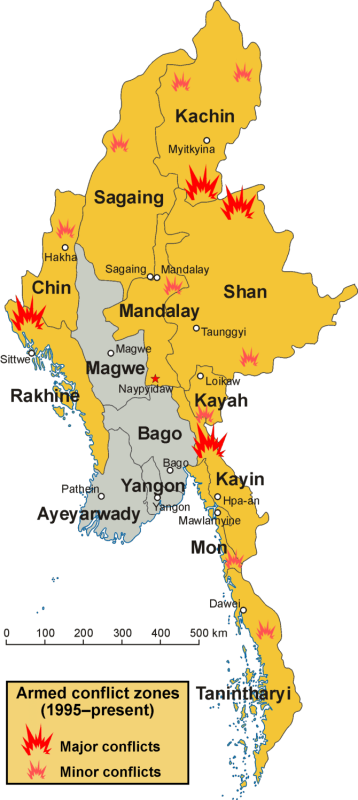Accessing statehood through armed conflict is daydream

484

Phyo Lin Aung (NP News) - Jan 1
According to the Montevideo Convention on the Rights and Duties of States, a sovereign state, as a subject of international law, must meet the following criteria:
• A permanent population
• A defined territory
• A government
• The ability to engage in relations with other states
These are the fundamental requirements for statehood.
Additionally, the process by which one state formally acknowledges another entity as a state is called recognition. This recognition can be expressed through an explicit statement or through actions that imply an intention to recognize the entity as a state. Each state has the right to decide whether to grant recognition, and this decision can carry significant political consequences. For instance, recognition is typically necessary for a state to secure sovereign immunity and to participate in diplomatic relations.
Achieving statehood requires meeting these criteria, and becoming a recognized state is not a simple process.
In our sovereign state, certain ethnocentric armed groups are attempting to establish their own state. Currently, they are pursuing this goal through violent means, attacking and seizing territory. They express pride each time they capture a town or city, often claiming that they are one step closer to achieving full statehood.
Although these groups have made military advances in certain territories, over the authorized government, many local residents have been forced to flee, resulting in a significant increase in displaced persons. Most of the war refugees, have not been able to return to their hometowns since 2021. As a result, it can be argued that these conflict-affected areas lack a stable, permanent population, which is a key criterion for statehood.
Furthermore, capturing additional territories does not necessarily serve as evidence of achieving statehood. If territorial expansion is pursued solely through force and without meeting the fundamental criteria for statehood, it could be argued that these ethnocentric groups are adhering to principles akin to fascism. Such actions, driven by conquest, reflect authoritarian tendencies rather than the legitimate establishment of a sovereign state.
They believed that armed conflict would be the most effective way to pressure the government and achieve their objectives. However, despite the ongoing violence, the State Administration Council (SAC) government has already extended an invitation to all armed groups for political talks, aiming to resolve the conflict through peaceful means. This diplomatic approach reflects the government’s willingness to engage in dialogue and find a non-violent solution, in stark contrast to the strategy of using force.
Some individuals with limited understanding or those with violent tendencies, as well as anti-government groups, have encouraged these ethnocentric factions to engage in battles and seize towns. However, when conflict erupted in their areas, many of these supporters fled to the safety of zones controlled by the SAC government. These armed conflicts have led to the destruction of towns and significant property damage, without achieving any substantial gains. Additionally, areas that remain free of conflict, such as Yangon, are facing an overwhelming increase in population density due to refugees. This influx, combined with soaring and often unaffordable prices for goods, has placed additional strain on both the displaced and local populations. Given these hardships, the ethnocentric groups should reconsider their reliance on violence as a means of pursuing statehood, as it has only led to suffering rather than progress.
Some ethnic armed groups have become increasingly bold, acting as if they were the legitimate government. For example, after the Arakan Army (AA) took control of Maungdaw town on December 10, reports indicate that they made efforts to transport rice through Maungdaw port to Teknaf port in Bangladesh for trade. These actions go beyond the authority of the SAC government, signaling the AA’s desire to be seen as the legitimate governing authority.
To achieve statehood, the ability to engage in relations with other states is also a key criterion, and it can be understood that the AA is attempting to fulfill this requirement. However, the Bangladesh government has stated that it is not possible to engage with groups like the AA, which is not recognized as a legitimate government. Therefore, the AA should understand that territorial victories alone will not lead to the recognition of sovereign statehood or the establishment of an authorized government.
International recognition is a critical step for these armed groups. The prolonged cases of Taiwan and Palestine, which are not officially recognized as sovereign states on the international stage despite being recognized by some of their allied countries, highlight the complexity of this process. Therefore, the recent emergence of the Arakan Army, attempting to build statehood, is an unrealistic goal. It can be seen as an impossible objective, akin to a daydream.
In conclusion, achieving statehood requires more than territorial control; it demands a permanent population, a stable government, and international recognition. The use of violence and force, as seen with the AA, does not lead to legitimate statehood. True sovereignty can only be attained through peaceful dialogue, diplomacy, and adherence to international law. Therefore, these armed groups must reconsider their approach and pursue peaceful solutions to achieve their goals.